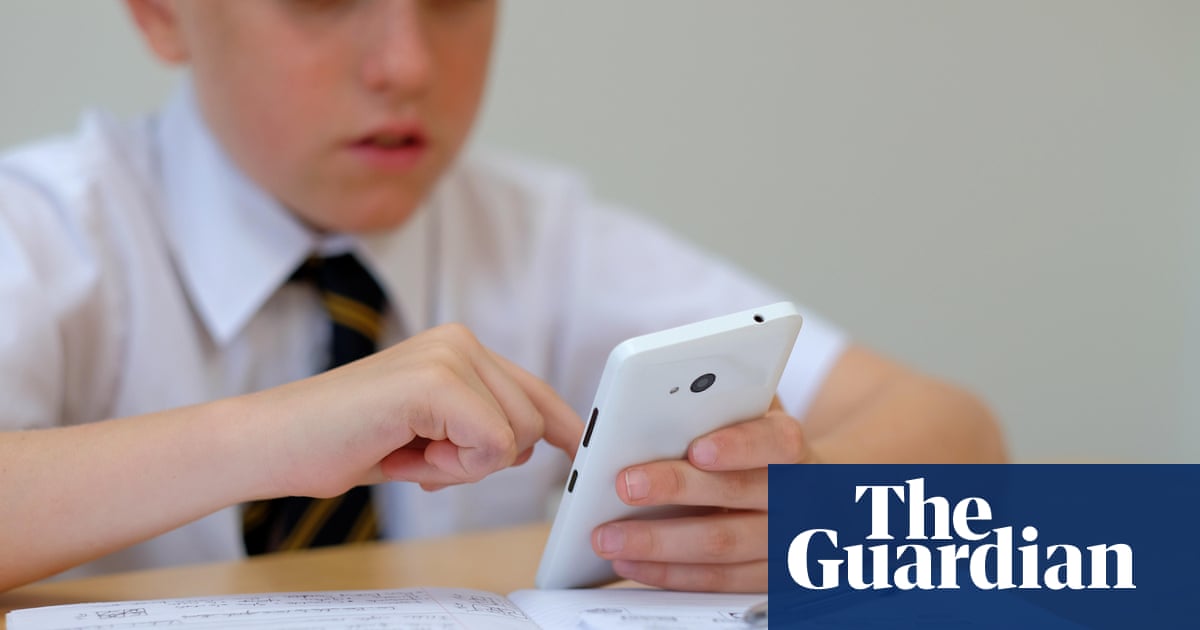Almost all schools in England have banned mobile phone use by pupils, according to the first national survey conducted, as the leader of the largest teaching union called for a statutory ban owing to the “damaging impact” on young people.
The national survey, ordered by Rachel de Souza, the children’s commissioner for England, showed that headteachers have swiftly instituted bans on smartphone use during school hours. The survey of more than 15,000 schools found that 99.8% of primary schools and 90% of secondary schools have some form of ban.
Daniel Kebede, general secretary of the National Education Union (NEU), the UK’s largest education union, said: “My personal view is I would support a statutory ban on mobile phones in schools. I think it would alleviate pressure on school leaders and teachers but also parents.
“I think there is a much-needed conversation to be had in this country about mobile phone use, online harm and the damaging impact that it has on our young people.
“The average 12-year-old has access to the most hardcore pornography on their mobile phone, and that is incredibly damaging to the wellbeing of young boys and their perceptions of women and girls, sex and relationships.”
Kebede’s comments show a marked change in tone among education leaders, who have largely supported school autonomy and guidance rather than government regulation.
At its annual conference next week the NEU will debate motions calling for greater regulation of social media companies to remove harmful content, including sexual violence or threats against women.
Kebede said “a complete social media ban for under-16s” was also in order. “These organisations, TikTok, Snapchat, Instagram and so on, you can really track the crisis in young people’s mental health as they have grown. And I think they should be viewed as [similar to] tobacco companies and regulated as such,” he said.
Bridget Phillipson, the education secretary, said phones had “absolutely no place in classrooms” because of the potential disruption.
“While this comprehensive evidence shows our approach of backing headteachers to implement bans in their schools is working, the Tories have been chasing headlines with no care for what’s happening on the ground,” Phillipson said.
“As part of our plan for change we will continue to ramp up monitoring and make sure every school, and every classroom, is phone-free, giving our children the best education.”
The Conservatives promoted an amendment to the government’s schools bill that required all schools in England to ban the use of phones but Keir Starmer rejected it as “completely unnecessary”.
The survey of school policies found some variation in the type of ban. The vast majority of primary schools said they required pupils to hand their phones to staff, or barred them from bringing the devices to school.
But 79% of secondary schools allowed students to keep their phones while banning their use or display, while 8% required phones to be handed in, and just 3% stopped pupils from bringing them to school.
Of the remaining secondary schools, nearly 6% said pupils could use their phones during lessons when approved by a teacher.
The children’s commissioner surveyed how long children aged eight to 15 spent on their phones, tablets, computers or consoles, finding that 23% spent more than four hours a day on average, while 20% spent between three and four hours.
De Souza noted that those children “aren’t doing that while at school”.
“If we are serious about helping children reap the many benefits of the internet, we need to get serious about regulating what they can see, where they see it and curbing the damage currently being wreaked on their health, attention span and safety by tech companies,” de Souza said.


